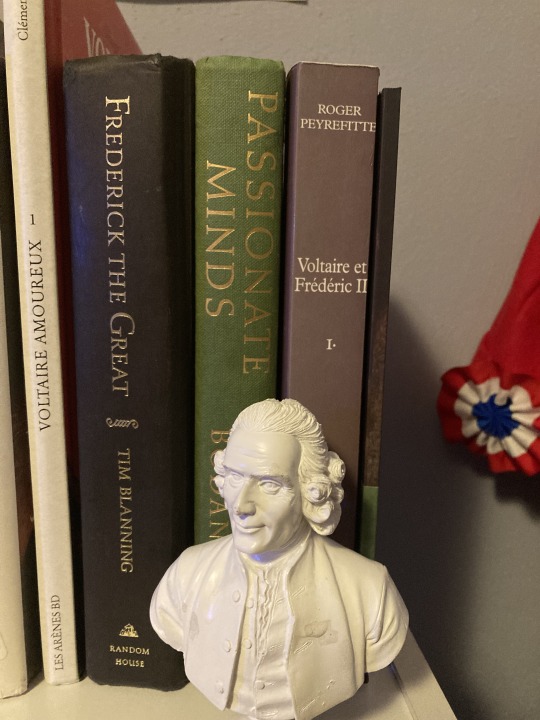Text

Brother Gregor never spoke and often spooked the neophytes with his appearance, but he was a gentle soul and a phenomenal cook and knew more ways to prepare a fish than the abbot knew hymns
8K notes
·
View notes
Text
Do you also have that one line from someone's letter or writing from the past that just makes you want to sob uncomfortably? Well, for me, it's this:

Émilie du Châtelet's 'I began to believe that I was a thinking creature' always hits me so hard.
#émilie du châtelet#something about internalising the majority's view that women are only there to look pretty and then meeting people who see something in you#that you couldn't have seen in yourself#fable of the bees#philosophy#women's history#women's rights#18th century#1700s#history#quotes#makes me wanna 😭#history fandom
9 notes
·
View notes
Text
Émilie du Châtelet is the best and most correct French philosopher
8 notes
·
View notes
Text
Roman Senator Mindset
Never admit your faults
Always resort to ad hominem
Suppress your feelings forever
Take a sabbatical as the city burns
You know what, just disembowel yourself
12 notes
·
View notes
Text

What can I add to make this Worse
#it suddenly went from great to excellent!#in like a horrible way but still excellent#also love the cockade ✨#bookshelf envy#Voltaire#frederick the great#18th century#émilie du châtelet#the messy love triangle: now on a bookshelf
4 notes
·
View notes
Note
Desmoulins was the most famous journalists in the history of the French Revolution, and despite the intense competition (Hebért and Marat), Desmoulins remained at the top of his profession because of his writing talent, and the newspaper "Le Vieux Cordelier" was his masterpiece..but Did Desmoulins have competitors and enemies? (apart from his famous problem with the Committee and with Robespierre) Was there really someone who wanted to overthrow him for one reason or another? Was anyone else strongly opposed to his views other than the committee? If so, who is it ? And was this opposition one of the reasons that ultimately implicated him and led him to the end of his path in life? And who was really his opponent? (if he existed)
Throughout his career as a journalist, Desmoulins came to release four different papers — Révolutions de France et de Brabant (86 numbers released between November 1789-August 1791), La Tribune des Patriotes (4 numbers released between April-May 1792), Révolutions de France et de Brabant: Second partie (October-December 1792) and finally Le Vieux Cordelier (six numbers+one unfinished released between December 1793-January 1794).
The first one of the papers — Révolutions de France et de Brabant — saw the light of day on November 28 1789, three months after freedom of the press had been declared by the National Assembly via the Declaration of Man and of the Citizen. According to Press in the French Revolution (1971) by John Gilchrist, as many as 250 new newspapers appeared between July and December 1789, of which the majority were friendly to revolution. It goes in other words without saying that the competition to get people to listen to what exactly you had to say was big. Camille and like-minded journalists did however not turn against one another in an attempt to take subscribers for themselves, instead they viewed each other as collegues and brothers in arms that fought (or I guess wrote) side by side for their principles. Throughout Révolutions de France et de Brabant you can find Camille giving shout-outs and republishing parts from a multitude of other likeminded journalists (try searching for the names of the authors within the digitalized journals and you’ll see), most frequently l’Ami du peuple by Marat, Orateur du peuple by Fréron, Le Patriote Français by Brissot, Annales Patriotiques by Mercier and Carra, Révolutions de Paris by Prudhomme and Courrier de Provence by Mirabeau. Many of these journalists were also not only brothers in arms but personal friends, as can be seen through for example Camille telling his father that ”my two collegues Brissot and Mercier, the elite among the journalists” had been among his wedding witnesses, this letter from Fréron to Camille telling him to publish a letter of his in the next number of Révolutions de France et de Brabant and this letter from Mirabeau to Camille. While from time to time they disagreed and called each other out on certain topics, it was not until they started to really devide on a political level that their relationships completely fell apart (see for example Brissot and Desmoulins).
If rivarly between like-minded journalists was something it would appear never really was a problem, Camille still had to bear with attacks/slander from journalists who disagreed with him, his loved ones being caught up in the crossfire, as well as straight up murder threats. Some of examples of this can be seen below:
M. Desmoulins, after having done so much for his glory, thought he could think of his honor, and he resolved to marry. He was sure to create the happiness of the one he would choose for his company, and out of respect for the blood of his masters, he wanted to give preference to one of the aunts of his king. This project is worthy of the highest praise. By allying himself with the royal family, he wanted to give himself a defender, and conform to the decrees of the assembly, which says in its declaration of the rights of man: All men are equal in rights. According to this principle, M. Desmoulins believed as much as anyone else that he had rights over Madame Adélaïde, and he sought to assert them.
The journal Chronique du Manège mocking Camille in an article titled Faits et Gestes de Sieur Camille Desmoulins (1791)
Yet I am still writing, someone will tell me. Yes, but I learn that on Tuesday evening, until midnight, four assassins were waiting for me, Danton and the Orator of the People (Fréron); the next day at the Palais-Royal, for having replied to people who had provoked me with insulting words, that I returned his contempt to Lafayette, I saw myself surrounded by aposted rascals who showed me their fists in the midst of patriots in silence, and awaited only the slightest defensive movement on my part to reply with daggers to my accusations against Lafayette. On Easter day in the middle of noon, aide-de-camp Parisot had knocked out Carra, in the presence of a patrol of 12 grenadiers from his section who did not say a word. […] On the evening of the 18th, in an infinitely large crowd of snitches and satellites of Mottier, a motion was made to hang us, Audouin, Fréron, Marat, Prudhomme, me, and all the writers who did not bend the knee before the idol.
Camille in number 75 of Révolutions de France et de Brabant (May 2 1791)
I left the de Vaufleury's literature cabinet with my veni mecum, that is to say, with a sturdy cane and pistols, as inseparable from the journalist as the king is from the National Assembly, and which are our veto. The same bookstore clerk who told me fifteen days ago that M. Lafayette despises me too much to try to assassinate me, dissatisfied with the account I had given of the conversation in my number 74, followed me with the number in his hand, and, pointing to the article, asked me if I recognized it. I replied that there was the law and the courts, if he thought he had cause to complain. Then the fellow gave me the customary compliments of these gentlemen in such a meeting, that I was a rascal, etc. etc that he would like to meet me, in a suitable place, that he would do his best to cut my throat; that if we were only outside the Palais-Royal, he would knock me out, that he feared neither my pistols nor my cane; and to prove it to me, he finished his harangue by hitting my face with the number as hard as he could. I had endured insults as did Pericles, Cicero, and many other great personages who were well worth me, and who were not lacking in heart, as they showed in stronger circumstances; but feeling myself colaphised with my works, I could not stand it; I remembered the beautiful exclamation of Demosthenes, apropos of the slap given to him by Midas, being slapped on the cheek, slapped in a public place, slapped in the presence of the Athenians who had honored me with their suffrages, etc. I looked with pity, not on this Midas, but on the Midas in front of me, who only had my number in his hand, and I admired his audacity to hit me with a patriotic paper, in the same place where I had first called to arms, where I had first taken the cockade. I could, I told him, blow your brains out, but at the same time I thought that, thanks to the revolution, a citizen was no longer obliged to go and get himself killed at Kevrein, by the first rascal who had insulted him. I reflected that a blow with the cane would suffice to repair the injury, and as a form of retaliation, I applied weight and measure to his shoulders. My assailant went back to insult and provoke me. I answered that I was not unaware that for the past two years, I have been crossing a forest where I am exposed; that consequently I was always provided with the precautions which a traveler should take against assassins; but that I did not accept their appointment.
Camille in number 77 (May 16 1791) of Révolutions de France et de Brabant
What a terrible quarrel I had the other day with Jean-Paul Marat about the misprint, to exercise the apostate! In spite of these disagreements, to which an incorrect impression exposes me, seeing a wife as interesting as mine be the butt of the most atrocious defamation for having attached herself to my fate; to the extent she cannot go for a walk in public with her mother without being told: what a pity that this pretty woman belongs to a hanged man?
Camille in number 78 (May 23) of Révolutions de France et de Brabant
So Desmoulins sure had enemies (I mean, you could basically say that about anyone who has ever chosen to make his political opinions known to the public, now as then). However, it’s hard for me to get an impression regarding if he was more hated (or loved for that matter) than any other successful journalist of the time, conservative or radical alike.
The second of Camille’s papers, La Tribune des Patriotes, was co-founded with his friend and fellow journalist Stanislas Fréron. However, it only ran for a month before it had to shut down, making it hard to say if it gathered any particular enemy. The same thing goes for the fourth paper Révolutions de France et de Brabant: second partie that ran for only two months and is so unknown it hasn’t even been digitalised yet.
For the fourth and final paper, Le Vieux Cordelier, you’re right in that it ended up making Camille unpopular with the Committee of Public Safety. However, what is often not underlined as much is that he started the journal very much in support of the committee (I mean, he even got Robespierre — more or less the figurehead of it — to proofread his first two numbers before sending them to the printer). If he in later numbers would deplore of some of the things currently going on and bring forward new ideas, his goal was never to overthrow the committee or even change its direction in a particulary radical way.
A bigger enemy was Jacques René Hébert, and it was to conbat him and his ”ultra-revolutionaries” that Desmoulins started the journal and Robespierre helped him with the first issues. After it got going, Hébert denounced Desmoulins three times at the Convention and/or Jacobins (December 21, 31 and January 5), three times in his journal Père Dushesne (number 328, 330, 332) and even in an entire pampleth — J. R Hébert, auteur du Père Duchesne, à Camille Desmoulins et compagnie, always with some variation of Camille being a moderate who was after him. That’s way more than the total of four times Camille was denounced by a CPS member due to his journal (Collot d’Herbois on December 23and January 5, Barère on December 26 and Robespierre on January 7) and in all those cases, the speaker was still trying to see in him a man of good faith. Hébert was not the only person to hold these opinions regarding Camille, but he was the most outspoken. Camille was not late to answer his attack and the Vieux Cordelier and the Père Dushesne were often compared and pinned against each other during the short lifespan of the former. In that way Hébert might be the closest Camille had to a ”nemesis” if I may use such a silly term — which it’s why it’s so ironic that they were both executed with less than a two week gap anyway, while their widows became friends while in prison and the last thing they did before being executed was hug each other.
I don’t know if I would say Hébert was responsible for Desmoulins’ demise, but I suppose the increasing bickering between the two contributed to the CPS decision to just eliminate both of them.
24 notes
·
View notes
Text
wish i was a late republican roman girl
i would listen to speeches by cicero at the rostra. i would read caesar's commentaries on the gallic war in the roman forum. i would fear invasions from the germanic tribes. i would marry a man with a purple bordered toga and distinguished ancestors and follow the mos maiorum. i would get proscribed and have my property confiscated and be declared an enemy of the state
628 notes
·
View notes
Text

The Octavianus Fragrance: for a price you can barely afford, you too can smell like sickness and desperation!
34 notes
·
View notes
Note
Émilie for the character bingo? Since I now have her quoted in the preface of my thesis, pretty much thanks to you and @chaotic-history. Also trying to get my supervisor excited about her as well!

SHES SO AMAZING I LOVE HER SO MUCH ÉMILIE MY BELOVED
13 notes
·
View notes
Text
No none of the above this is for the wine enjoyers
#I staunchly believe in the red wine supremacy#but I respect everyone else's incorrect opinions 💅#polls
1K notes
·
View notes
Text
"Claudius declined to unscramble the omelette" is perhaps my new favourite sentance ive ever read in an academic article and definitely the best possible way to describe a Roman emperor avoiding dealing with conflict
210 notes
·
View notes
Text

the comments.......
#<- re: prev#beautiful & true!#the 'm' in feminism stands for murder actually#and there's two of them - just saying#livia drusilla#ancient rome#roman history
17 notes
·
View notes
Text
do you ever remember the note the scribe left at the end of catullus manuscript G and want to burst into tears
11K notes
·
View notes
Text
"You should be at the club". You're absolutely right. If by "the club" you mean the Jacobin Club.
I should be at the gallery, listening to the speeches and cheering on the Montagnards.
#frev#french revolution#frev shitposting#frev memes#jacobin club#maximilien robespierre#history shitposting#history memes#sorry if this has been done before#frev community#montagnards#french history#you should be at the club#bad jokes... Saturday?#it's everyday here tbh
39 notes
·
View notes
Text
There should be a Hornblower type fictional story about the Napoleonic Wars from a British perspective where there's one guy (British) who is like ALWAYS talking about how much he despises Napoleon all of the time every day and eventually someone's like you know just cos he's fighting against England doesn't mean he's the devil incarnate and the guy goes "what? why would I dislike him because of that? I hate him because he betrayed the revolution! vive Robespierre!"
#I crave another Hornblower episode either way#but this post made me crave it even more#frev#ramblings#french revolution#robespierre#hornblower#1800s
39 notes
·
View notes
Text
Something something Oscar Wilde's The Ballad of Reading Gaol and his subsequent self-imposed exile in France. The gaol to Gaul pipeline if you will —
Actually obsessed with the idea of a historical novel where someone is sent to gaul instead of gaol. we are so sick to death of your nonsense that we have decided that we are sending you to france immediately
#oh look my obsessions are colliding#ancient rome#frev#Oscar Wilde#because of the Ballad of Reading Gaol#get it haha#certified banger post#tagamemnon#literature#history shitposting#history#english literature#literature memes
40 notes
·
View notes
